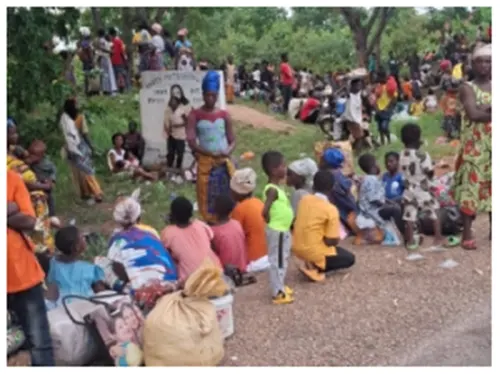News about citizens of a country fleeing to others in search of safe havens is not new. We read about this trend in newspapers and other media channels, especially as these unfold in Sudan and other troubled parts of Africa.
As we read in awe about the sad developments, little did we know that the trend could befall us.
Many wondered whether news about some Ghanaians fleeing to neighbouring Cote d’Ivoire is real when the Sawla-Tuna-Kalba conflict hit the news-stands. Today, some 14,000 Ghanaian citizens have fled from the new conflict zone of Sawla-Tuna-Kalba to Cote d’Ivoire in search of safe havens.
It is saddening that what started as skirmishes between disagreeing communities has escalated to this state of bloodshed.
That is not the end of the sad story; some 48,000 more are in some parts of the country as internally displaced persons.
The sorry state of residents of the restive areas is reflected in among others the pregnant women among those wandering for safe havens and the innocent children enduring what they know nothing about.
Earlier, we heard about how one of the internally displaced persons while on his way to search for a safe haven was shot dead by an unidentified person.
This is a major conflict which should be tackled with all sincerity lest it spreads to neighbouring areas which for now are outside the axis of the bloodshed.
Whatever is at the bottom of the cause of the disagreement and bloodshed, this should be unearthed and addressed swiftly.
Sadly Ghana has joined others on the continent with some of her citizens sheltering as refugees in neighbouring countries.
Land issue might be a factor for the conflict, we think that it could have been a spark that ignited a long-standing misunderstanding. This is what should be addressed.
The cost of maintaining the peace or even law enforcement in restive places is high. With Bawku on the hands of the state, this fresh one would be too much to bear.
We have observed the donations being dished out by the Ivorian authorities to the Ghanaian refugees for which we express gratitude.
Times change. Some years ago when that neighbouring country suffered unrest, victims of the situation fled into Ghana and enjoyed the traditional Ghanaian hospitality. Today our compatriots have had to seek refuge in that country too.
We demand a comprehensive report from the government about the state of security in the conflict zone and efforts being made to reverse the situation.
While we appreciate the enormity of addressing conflict which is steeped in ethnicity, it is our belief that traditional authorities perhaps outside the epicentres of the disturbances can be effective in restoring relative normalcy.


